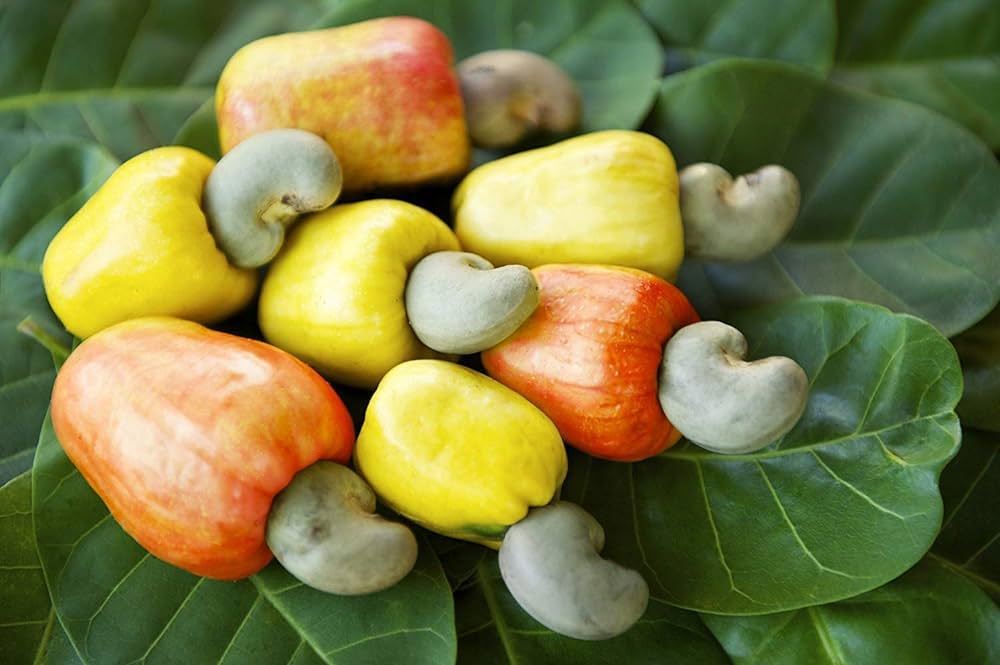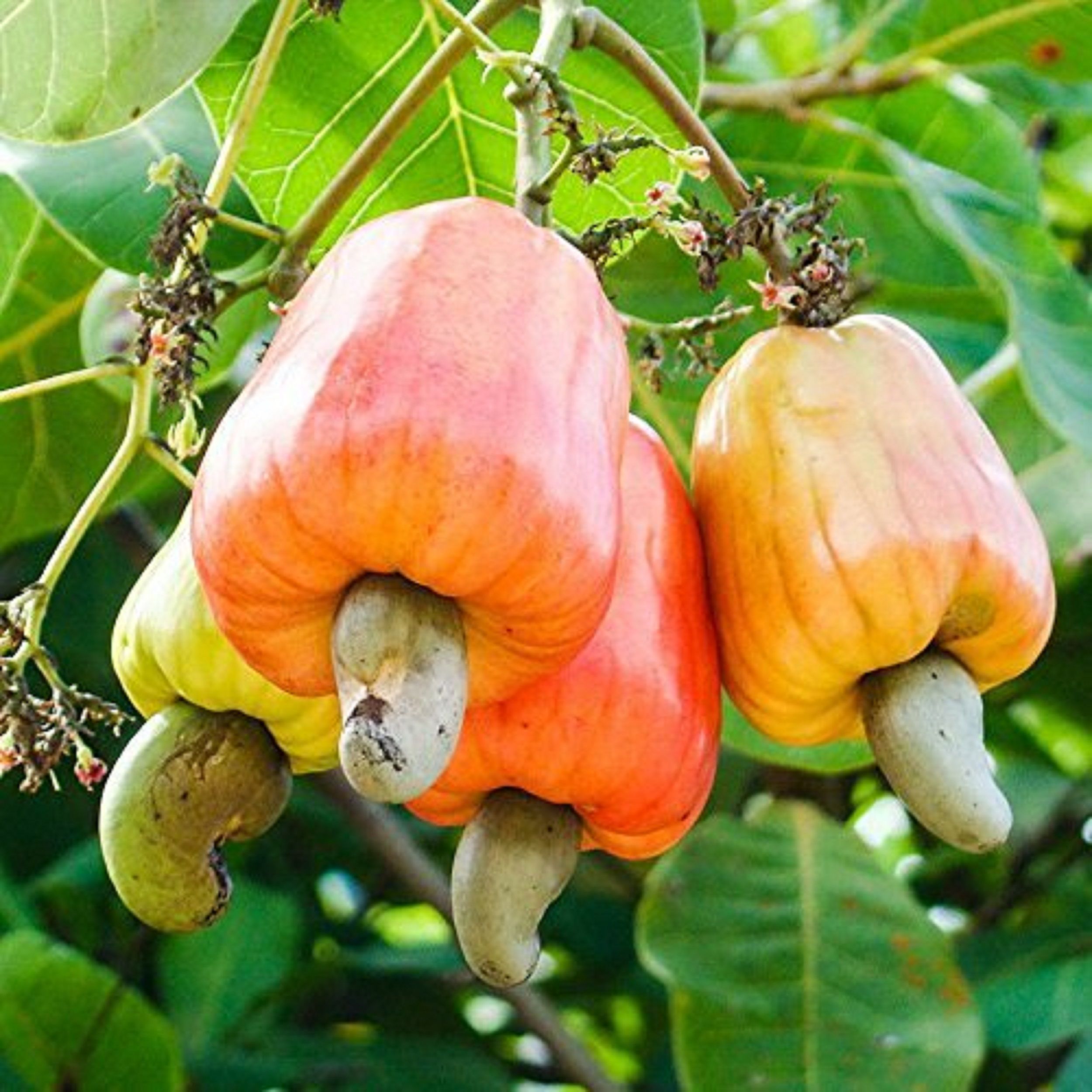The cashew tree (Anacardium occidentale) is a tropical evergreen tree that produces two distinct yet interconnected products: the cashew nut and the cashew apple. Native to northeastern Brazil, the cashew tree is now widely cultivated in various tropical regions worldwide, including India, Vietnam, Nigeria, and Tanzania. Both the cashew nut and the cashew apple have unique characteristics, nutritional benefits, and economic significance. This article delves into the details of these two products, highlighting their differences, uses, and importance.
1. Cashew Nut: The Edible Seed
Description and Structure
The cashew nut is not a true nut but rather a seed that grows at the bottom of the cashew apple. It is kidney-shaped and covered by a hard shell containing a toxic resin known as anacardic acid, which is harmful to human skin. The cashew seed is extracted from this shell through a process that involves roasting, steaming, or boiling to neutralize the toxins and facilitate shell removal.
Nutritional Value
Cashew nuts are highly nutritious and are considered a good source of healthy fats, proteins, vitamins, and minerals. A 28-gram (1-ounce) serving of cashew nuts provides approximately:
- Calories: 155
- Protein: 5 grams
- Fat: 12 grams (mainly monounsaturated and polyunsaturated fats)
- Carbohydrates: 9 grams
- Fiber: 1 gram
- Minerals: Rich in magnesium, phosphorus, zinc, and iron
- Vitamins: Contains vitamins E, K, and B6
The healthy fats present in cashew nuts, particularly oleic acid, are known to support cardiovascular health by reducing bad cholesterol levels (LDL) and increasing good cholesterol (HDL). Cashews are also a good source of antioxidants, which help combat oxidative stress and reduce inflammation.
Uses and Applications
Cashew nuts are popular as a snack and are used extensively in culinary applications worldwide. They can be consumed raw, roasted, salted, or seasoned and are a common ingredient in desserts, salads, stir-fries, curries, and granola bars. Additionally, cashew nuts are processed into cashew butter, a healthy alternative to peanut butter, and cashew milk, a dairy-free milk substitute.
In addition to their use as food, cashew nuts are used in the cosmetics industry. Cashew oil, extracted from the nuts, is used in skincare and haircare products due to its moisturizing properties.
Economic Importance
Cashew nuts are a valuable cash crop for many tropical countries. Countries like Vietnam, India, Ivory Coast, and Nigeria are among the top producers and exporters of cashew nuts globally. The global demand for cashew nuts has steadily increased due to rising health consciousness, making them an essential commodity in international trade.
2. Cashew Apple: The Juicy Accessory Fruit
Description and Structure
The cashew apple is the fleshy, pear-shaped pedicel that grows above the cashew nut. It is often brightly colored in yellow, orange, or red and has a sweet, slightly astringent flavor. Unlike the cashew nut, the cashew apple is not as widely recognized outside the regions where it is grown, largely due to its highly perishable nature.
Nutritional Value
Cashew apples are rich in vitamins and other beneficial compounds. A 100-gram serving of cashew apple provides:
- Calories: 53
- Carbohydrates: 13 grams
- Fiber: 4 grams
- Vitamin C: Extremely high content, with around 200-300 mg, making it a powerful antioxidant
- Minerals: Contains calcium, potassium, iron, and magnesium
The high vitamin C content of cashew apples boosts the immune system, aids in collagen synthesis, and enhances iron absorption from plant-based foods. Cashew apples are also known for their anti-inflammatory properties and potential benefits in reducing the risk of chronic diseases.

Uses and Applications
While the cashew apple is edible and packed with nutrients, its high perishability limits its availability in global markets. However, in regions where cashew trees are grown, cashew apples are often consumed fresh or used to make juice, jams, syrups, chutneys, and alcoholic beverages such as cashew wine and cashew feni (a popular distilled spirit in India).
Cashew apple juice is a refreshing drink that can be consumed on its own or mixed with other fruit juices. Due to its astringency, the juice is sometimes blended with sugar or other ingredients to enhance its flavor. The pulp of the cashew apple can also be used as livestock feed after juice extraction.
By-products and Industrial Uses
The cashew apple is not only used for human consumption but also has several by-products. The juice, after extraction, can be fermented to produce bioethanol, a renewable energy source. The leftover pulp is often used as a natural fertilizer due to its high nutrient content.
Potential Health Benefits
Consuming cashew apples is believed to have several health benefits, including improving digestion, boosting immunity, and promoting skin health due to their high vitamin C content. The fruit’s fiber content also aids in digestive health, making it a beneficial addition to the diet.
3. Cashew Industry: Challenges and Opportunities
The global cashew industry faces several challenges, including price volatility, climate change, and labor issues. However, opportunities abound in value addition, such as processing cashew nuts and apples into various products, enhancing storage and transportation infrastructure, and expanding market access. Countries in Africa, particularly Nigeria, have enormous potential to capitalize on cashew production and export due to favorable climatic conditions and increasing global demand.
Investment in research and development to improve cashew cultivation, pest management, and post-harvest handling can further boost productivity and income for smallholder farmers. Additionally, promoting cashew apple processing can provide alternative income streams and reduce post-harvest losses.
Conclusion
The cashew tree is a versatile and valuable crop, offering both cashew nuts and cashew apples with diverse uses and benefits. Cashew nuts are globally recognized for their nutritional value and economic significance, while cashew apples, though less known, provide substantial health benefits and potential for value addition. By leveraging the full potential of both the nut and the apple, the cashew industry can contribute significantly to the economies of producing countries, promote sustainable agriculture, and provide consumers with healthy and nutritious products.
Ajigofarms is a reliable global agricultural purchase sourcing with profound expertise in the manufacturing, and exportation of food crops. We are tested, and trusted suppliers of all kinds of cash crops and food crops. Our constant supply chain solution makes exporting easy, quick, and safe, we are identified with timeliness and meeting up with deadlines. Regardless of the region you are located in worldwide, you can reliably order your Agric products and be rest assured of successful delivery.




